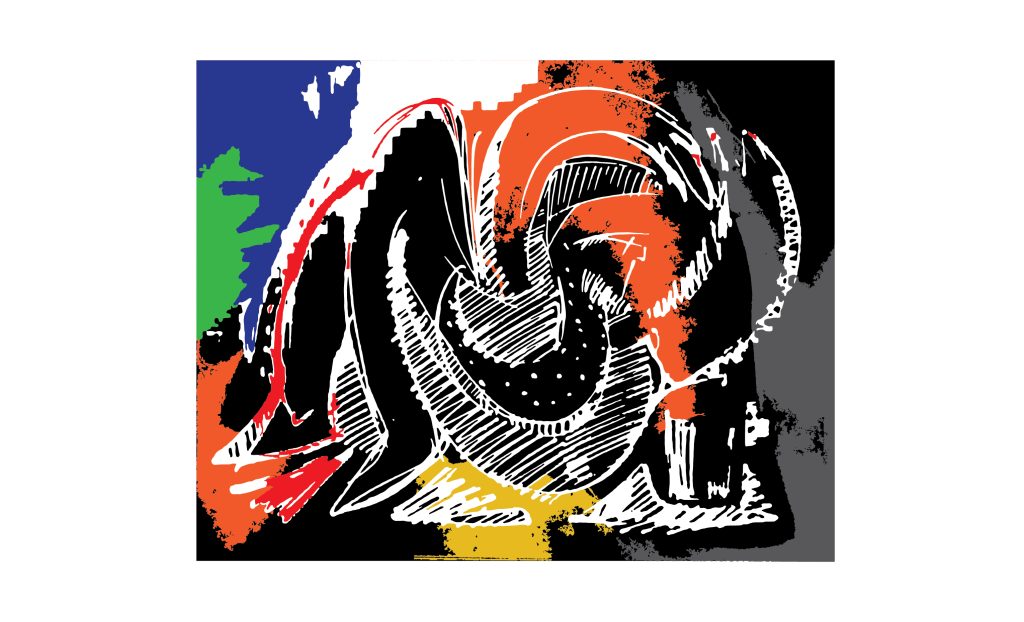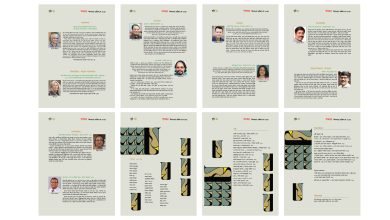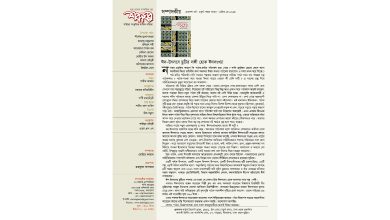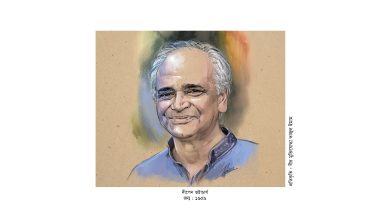Story : Akalu Till Death : Manju Sarkar
Translated from the Bengali into English by Junaidul Haque

The introduction of the story
At midnight two unknown pedestrians wake up Akalu, whisper an enquiry into who else’s but his ears, in which hut stayed his wife? At that moment Akalu was no longer exactly Akalu. Before seeing this sudden metamorphosis of Akalu, his position and the nature’s condition we must know well.
Akalu and the dam
Akalu was lying on the high dam. A government dam. The river and the sandy land on its bed on one side, land of crops on the other side, the village full with trees and plants, homesteads and household work. Akalu’s straw-roofed hut is adjacent to the slope of the dam, on the ground of the dam, seemingly in hiding after falling on its face. The passers-by of the dam road look at the river, at the sandy land on its bed, also at the beauty of the village opposite to it but rarely look at the huts springing up near their feet on the land of the dam. No one has the necessity to think for a second to ascertain why huts are springing up, spoiling the beauty of the dam. As a result it is natural that unknown wayfarers have not a drop of affection or curiosity for the inhabitants of the huts. Accepting this normalcy easily, Akalu spreads his bamboo mat on the road. Leaving aside winter and rainy days, on the rest of the nights of the year, the dam road is Akalu’s night bed.
Surely not Akalu alone, on irritatingly hot nights many villagers rush to the dam. They sit, smoke birhis (village cigarettes) and gossip, to cool their body in the wet winds running in from the river. When the night is old they return to their huts to sleep with their woman. Even after that the number of men spending their night on the dam, lying on a napkin or mat, is not insignificant.
However, in comparison to others, Akalu’s relationship with the dam is quite deep. As if his temporary address has become his permanent drawing room or the verandah of his hut. Other than his time of work, Akalu spends his time sitting and lying down on his open verandah. Even if he sleeps beside his wife at home, he can’t fall asleep easily. The reason is not only the attraction of the soothing south wind. Lying under the open sky, Akalu’s heart also gets very big. He thinks such a lot! If sleep doesn’t come, he talks to himself in various tunes, like looking at the stars and singing, moreover thinks aloud at times. However he can’t make anyone understand the pain or pleasure of lying on the dam alone, not even himself. His wife tries to scare him, the jinn of the tamarind tree may come one day to frighten him! The snake which came to the dam during floods, it may bite her sleeping man! Hearing such words from his wife, Akalu replies desperately, let it bite. Because after settling on the dam, he no longer wishes to live in this world.
The roof of Akalu’s hut and the height of the dam are on the same level. Lying on the dam, he can keep watch on his home and his wife in it, and turning towards the opposite can at times see clearly his old hut in the river. He doesn’t hear the sweet murmuring smile of the waves but sees the swelling, topsy-turvy chest of the river like a white sandy land. His hut becomes fixed and clear in the restless flow of water. Akalu sees – his wife is drying her blue saree on the fence of his straw house, the red spathe of seeded bananas is out in the banana bush, and the cow bound at the root of the small mango tree bred by him is chewing hay. Akalu sees – he is sowing onion seeds in his own land with a weeding tool in hand, wife is returning home after a bath in the river and with a pitcher on her waist, calling her husband loudly, ‘O Santu’s father, catch your Santu, catch him’, … Akalu turns back to find naked, two-year-old Santu waddling to his father after coming out of their hut!
Akalu loves to see the game of rising of feelings of various colours of lost days from the chest of the river. As the sound of erosion of the bank negates all memories and dreams, Akalu sighs and keeps looking at the river. Talks loudly and directly to Allah, ‘We have lost everything and are now street beggars. If the river doesn’t rise any more, won’t you ever register three and a half cubits of land in my favour in this big world, o Allah?’
When a conversation like this with Allah drops like a song with false notes, neighbours smile on hearing it. Someone consoles him in fun, ‘He will give, Akalu, give, register the full river in your name.’ If he is in a good mood, Akalu replies to the joke. If he is sad or hungry, he talks with Allah absent-mindedly. If sleep doesn’t come, he counts the stars of the sky. A very distant, sparkling star reminds him of his dead child’s face.
Even after the river gulped down his homestead, Akalu built a hut on another’s land on the sandy land and Santu was growing up even there quite happily. In the big flood of the last season he took shelter on the dam with many others and after that the dam has become his home. During the flood Akalu received no government relief yet his son was happy and alive but only seven days after he built his hut on the government dam, his son died in only three days of fever, uttering delirium. People say that the tamarind tree beside the dam has a jinn, some say it is a ghost. That jinn or ghost possessed Santu. Akalu has buried his son in government land after his death. Lying on the dam, he keeps a watch on his present and past hut as well as his son’s grave. Deep at night he looks at the tamarind tree and complains even to the invisible jinn at times, you snatched away my dear one for nothing, don’t you have anything to give me in return?
Even after lying on such a big government road, Akalu finds no way to earn one seer of rice or one taka, nobody pushes forward a handful of food even if he remains hungry for a couple of days, then how else can Akalu live without talking to jinns and ghosts, in addition to Allah, in sorrow?
On such a night, having no work for two days, Akalu fell asleep at a time after thinking of ‘them’ while looking at the tamarind tree beside the dam. The eleventh day moon was leaning towards the west and the shadow of the tamarind tree fell on the road and was gradually coming towards Akalu’s bed. And as usual he spread his mat in the middle of the road. After the last flood has harmed the dam, bullock carts couldn’t ply over it, even during the day men with bicycles were rarely seen on the dam road. Those who walk don’t ever raise any question about Akalu’s sleeping on the middle of the road. They go to their destination without disturbing his sleep, stepping aside the sleeping Akalu. But the two unknown passers-by of midnight not only stand beside Akalu’s bed, they sit right on it.
Those who wake you up at midnight
When the light of the torch suddenly dazes his face, Akalu nervously gets up and sits on his bed. Seeing two unknown men on his mat, he is surprised and afraid as if he has seen a ghost; he asks, ‘Who are you?’
Even on such a moonlit night one has a torch light in his hand like a gun, the other has a wrist-watch, both have cigarettes in their mouth. They are wearing ordinary lungis and shirts. Akalu can’t clearly recognise the two boys even after looking at their faces for a long time, he feels that he has seen them in the Hatkhola Board Office or the tea shop in the bazar. Akalu again asks in a louder voice, ‘Who are you? Where are you going at such late night?’
The young men snub him in an undertone, ‘Shut up. Don’t shout. If we disclose our identity, you will be in fear, all people of the village are afraid of us.’
Akalu considers himself the most helpless and unfortunate person in the village. It is natural for him to be very timid. He can’t pluck up courage to ask any other question. One of the strangers speak with the mood of the police.
Why are you sleeping on the government road, leaving your home?
This one is my home, brother. This is my hut.
His identity satisfies the young men, it seems. One of them brings out a pack of cigarettes and puts forward a full cigarette, ‘Take, smoke. I have secret words to share with you.’
Akalu never has a distaste for birhis, if he has none with him he has the habit of taking from others and smoking. From the terrible midnight strangers he takes a full cigarette as blessing instead of punishment. Creating an intimate environment with the fire and smoke of cigarettes, the young men disclose their identity, ‘Don’t you know us? Our house is under the banyan tree at the three-road junction, this is Mohammad military, I am Zafar Kazi. Haven’t you heard our names?’
Akalu doesn’t have the courage to say no. Timidly he asks, ‘Well, brothers, where are you going at such late night?’
The two young men were looking at the low bamboo huts of the dam. One of them asks in a whispering voice, ‘In which hut does Akalu’s wife stay?’
Till then Akalu’s chest was trembling in fear and surprise, now his words tremble too as he replies, ‘Why, why are you looking for Akalu’s wife at such late hours of the night?’
The young men smile and reply, ‘Haven’t you understood – even now you haven’t understood the reason behind coming for Akalu’s wife at such late hours! Show us the hut, we shall give you a taka too.’
Akalu really can’t understand why two unknown dacoit-like young men are looking for his wife at such late hours and why they want to give him money. In an instant he remembers that his wife has received Taka 500 as loan from the NGO office a month back. To entangle herself in that loan-net she has even formed a group with poor women like herself. To attend meetings of the group, NGO staff bicycle to the dam often. Akalu’s wife Teesta Bibi is neither afraid nor shy to talk even to the officers. She doesn’t get to eat regularly but she dreams of having her own homestead again. In the spell of her dreams, she has announced that day, if she again gets an NGO loan, she will buy two decimals of land. To get loan, she will herself study too along with her group-mates. With these dreams and hopes Akalu’s wife now goes to the NGO office alone like romping school-girls, goes to middle class families for some food, again brings pills from the Hatkhola family planning office and takes them as she doesn’t want to give birth to a son on the road. After losing her homestead to the river, Akalu’s wife is now a street woman. A whole lot of people now see her! They say a lot too. Akalu can’t easily accept such exposed transformation of a housewife, nor can he deny it.
What happened, don’t you know Akalu’s wife? Quite a good thing, met her that day under the banyan tree, she talked to us too. She stays in a hut on the dam road.
Akalu bends down his head in shame and fear. In a faint, trembling voice he says, Akalu is my name. Akalu’s wife is my own wife. Why are you looking for her at such late hours?
The young men get nonplussed for a moment, they look at each other. In their search existed Akalu’s wife, she had as if no connection with a man named Akalu. One of them smiles and says, ‘We have come to the right place. It is you whom we need, man.’
The other questions with surprise, ‘Why are you lying on the road, leaving your hut! Is anyone in the hut?’
Protest jumps in Akalu’s scared voice, ‘What do you think of us? Don’t we have respect because we live on the road?’
Again shouting! We have come to help you. Before on which sandy land of the river you had your home?
Raising his finger, Akalu clearly shows on the river-bed, ‘There you can see. My homestead and a good amount of land.’
Now what do you do?
What to do – I work as a labourer. During the last flood I raised a hut on the dam.
You won’t have to stay for long on the dam anymore, Akalu. Our Prime Minister is a friend of the poor. Government has taken a project to build homes for the poor of river erosion, land will be given too. We shall tell our MP and include your name first in the list. Beside that during the next flood you and your wife will get the most relief goods by the grace of God.
Akalu remembers the failure of running after the member, chairman and other government people to get relief and VGF cards during the last flood. In a bitter tone he says, ‘You have come to tell me about government charity at midnight! What is your intention?’
To discuss something secretly among themselves the boys go to some distance from Akalu. Shall Akalu run to his hut in this respite? But if they follow him and attack his home? Is he in the grasp of dacoits or ghosts at midnight? Akalu looks at both sides of the dam road. Strange, not a single man on the dam today as it is not hot. Hasn’t Teesta Bibi heard his long conversation with unknown people so far? They come back before the rocking of his heart, in hesitation and fear, stops. One of them sits on Akalu’s mat like before, also pulls and makes Akalu sit. Bringing out five one-taka coins from his pocket and thrusting them into Akalu’s hand, he says, ‘We told you that we have come to help you – you couldn’t believe us! Take, keep this money for the time being. Smoke, smoke another cigarette.’
As they put five metallic coins in his hand, Akalu first suspected, are these forged coins or obsolete gold coins? Are these mysterious strangers dacoits or some other people? Did God send jinns to put an end to his misery? The cigarettes they are smoking, Akalu has never smoked them before, never seen them too. The smell is strange too.
The young man with the torch said, ‘You two sit and gossip. Hey, I am very thirsty. I am going to have a glass of water from Akalu’s hut.’
While the youth was getting down towards his hut, a scared Akalu tries to stop him in a trembling voice, ‘Okay, brothers, you sit here, I am myself bringing water for you.’
But the lad with the wrist-watch pulls at his hand, ‘You sit here. Your wife will give water. Sit, let us gossip. How many years are you married? No children? Is your wife sleeping alone at home every night? …’
He somehow answers the lad but Akalu is all ears to his hut. But not thoughts of his wife, he first remembers the goat, the only costly property at home. Teesta Bibi has bought the goat for 400 taka after getting loan from the village NGO office. After getting care for a month it now looks attractive. Do the two young men intend to steal his goat? But he can’t pluck up courage to shout and insult the guests, looking as terrible as jinns or dacoits, doubting them as goat-thieves. Only his chest throbs.
Hearing his wife’s very harsh and loud cry floating out of his hut, Akalu and his guard guest raise their head like a stork and look at the hut, both get up with speechless fear. Akalu’s wife’s cries, as if colliding against the high dam, get sounded on all sides, piercing the silence of midnight, ‘Thief! Thief! A thief has entered my house, O Santu’s father, come with a stick … I have caught a thief …’
Akalu and the stranger rush down at the same time. The door of the hut is on the opposite side of the dam, they suddenly stop on seeing a strange scene in the dying moonlight in front of the open door, they can’t decide their own responsibility. Akalu’s wife has grabbed the thirsty young man with both hands, and he is hitting her with his torch, busy controlling his disorderly lungi with the other hand and in his whole body is the activity of getting himself freed. Teesta Bibi’s thief-catching excited shout has awakened the goat of the hut, from one of the neighbouring huts an awakened male clears his voice and a lady cries, whose hut has the thief entered…
Akalu first goes to his wife and reprimands her, ‘Don’t shout. Not a thief, not a thief. Let him go, bitch, he entered to quench his thirst.’
But Teesta Bibi’s angry appearance doesn’t change, she leaves the thief to her husband but replies in a fierce voice, ‘Thirst for water at midnight! Bastard, I shall smash your testes in one hit, don’t you know Teesta Bibi yet?’
Akalu protests in a weak voice, ‘Ah, not a thief. Do you know him? He hasn’t come to steal your goat.’
The young man with the torch pants with the fatigue of defeat, ‘Akalu, you put me inside your hut and insulted me! Its consequence won’t be good. How strong you are, bad woman, I shall see too, be ready. Let us go, man, let us go back today.’
The story-telling old man’s hair-raising story
Before the thieves could hardly leave the dam, a crowd of awakened neighbours gather on the slope of the dam around Akalu’s hut, Akalu and his wife. On hearing Teesta Bibi’s voice the old head of a middle class family has rushed in too, how can close neighbours forget excitement and sleep like the dead?
Besides when the story-telling old man comes to the dam, then there is a small crowd on it only to listen to his stories. Immediately after coming, as if to find new juicy stories, he directly asks Akalu, ‘Was it a thief or a snake which came to drink your wife’s milk? Other than this, what do you have in your hut, Akalu?’
Instead of feeling shy, Akalu’s wife gives a thief-destroying roar, ‘Stealing my things is not that easy, grandpa. If people came forward at the right time, could the bastard thief escape? If I had the chopper near me, I would slaughter him.’
And where was Akalu?
To free himself from his illusion Akalu now himself shouts and informs, they were not thieves, they were not bad people. The two men lived near the base of the banyan tree of the three-road junction. Mohammad Military and Zafar Kazi were their names. They perhaps worked abroad, they were at home on leave. They were airing themselves on the dam. Sitting on the dam, they talked to Akalu for a long time. Then one entered his hut to drink water. Giving a true description Akalu pleads innocence, ‘If someone wants to drink water in thirst, can you say no?’
Everybody present including the story-telling old man are amazed because they don’t know anyone with such names in any house of the village near the banyan base, haven’t even heard the names. New residents of the dam may not know them but the story-telling old man is a local man for seven generations. He is the first to get excited in surprise, ‘What name did you say? Mohammad Military and Zafar Kazi of the banyan base? They are long dead! You are telling me a story two ages old!’
To prove that Akalu’s story was not at all trustworthy the story-telling old man starts his own story. Mohammad Military was a Pakistani soldier. And Zafar Kazi was a notorious razakar (war-criminal). To make the identity of these two vivid, the old man draws in even radio, TV, newspapers and the Prime Minister as witnesses. And this story of his is not a story faked by him, to prove that he reminds his listeners in the beginning, ‘Don’t you remember Sheikh Mujibur Rahman and the liberation war? Akalu was not perhaps born then, that liberation war period. The Pakistani soldiers then killed lakhs of Bangalees, burned countless houses, and dishonoured lakhs of Bangalee mothers and sisters. In fear of the army so many people left their country and fled to India! Even this me once ran like a rat leaving my house in fear of razakar Zafar Kazi, swam over to the other side of the river. If a woman caught their eyes, she was doomed. Akalu’s wife is a young woman, the Pakistani animals didn’t spare even a three-year-old. After that the country became independent. Mohammad Military and razakar Zafar Kazi were caught by the Mukti Bahini. They were tried at the banyan base in front of thousands of people. The Mukti Bahini took revenge by punishing them for three days at a stretch. If I remember that event, my body hair stands erect even now. Before death Mohammad Military and the razakar groaned so much for water! None had the sympathy to put a drop of water in their mouth. After death dogs and jackals ate their dead bodies in the bush of the banyan base. And even after death the rogues harmed so many people as ghosts! Akalu is telling me the story of those ghosts! Hey Akalu, did Mohammad Military really want drinking water from you?
Akalu has seemingly lost his speech. He shakes his head to say yes and keeps looking at the distant wood-apple tree. Looking at Akalu, many shudder in fear of the military ghosts. But close neighbour Bashiruddi smiles in disbelief. He teases Akalu, ‘Telling us a ghost story, do you want to hide your wife’s character? Whom did you push into your hut at midnight, you know better. We don’t need to know.’
Banu’s mother hoots, ‘Shame on you! Fate has forced us to live on the road with a bad man like you. If you were in a society, you would be driven out of it by now.’
Making comments like this, neighbours begin to leave for their own home. Akalu or his wife gives no reply. The story-telling old man, putting his hand on Akalu’s cold shoulder, says, ‘Swearing by Allah and His Qoran, tell me, did the two men utter these names?’
Akalu only shakes his head.
Akalu and his wife Teesta Bibi
After the dam road gets perfectly silent and desolate, Akalu and his wife again enter their hut. To sleep for the rest of the night, Akalu lies beside his wife in his hut. The goat is still crying softly with breaks. Beside this crying, the goat’s excreta inside the hut and Teesta Bibi’s body smell combine to keep the darkness sultry. Sleep doesn’t come to Akalu. Even lying beside his wife, Akalu remains in the grip of Mohammad Military and Zafar Kazi, whom he had seen on the dam. His chest is throbbing faster than before.
Teesta Bibi taunts her husband and says, ‘What has happened to you, Santu’s father! Sending a flippant young man home, why do you tell a ghost story for nothing! Who are those young guys?’
Shut up, bitch. You grabbed him, shoved each other, pulled at his lungi, even then you couldn’t recognise your terrible enemy yet?
Haven’t seen them before on the dam. From where did the satans come here to die?
Keep quiet, woman. They will come again.
Let them come. If they come this time I shall cut the two satan’s penises with scissors.
Haven’t you heard the old man’s story? They have arms. To take revenge of insult they will come again this night. Santu has been snatched away, now I will also get killed. They will also put our hut on fire, after killing me they will cool your oil. I couldn’t, now your lovers will teach you the right lesson. See here, bells ring inside my chest with a sound! Santu is calling me, ‘Baba! Baba!’…
Teesta Bibi’s fear on seeing her husband’s possessed existence on the bed is more than her fear on suddenly discovering a thief in her hut. She has goose-flesh. She pushes him with both hands to remove her own fear and her husband’s ghost.
What has happened to you, Santu’s father! I shall go to the member’s house tomorrow and complain against them. Tell me the correct names and addresses of those two bastards.
Member-chairman and police can’t touch their hair. They are very powerful. They wanted to give me so many things out of kindness. But for you, woman, good turned into harm. There will be bad reputation, I shall die too…
Teesta Bibi keeps quiet for a while and listens to her husband’s delirium. She looks for courage and logic inwardly to prove the ghosts false. Then blaming her husband for the incident, talks in a subdued, fierce voice, ‘Shame! Unknown man tempts you and you send him to sleep with your wife! What a man of mine! Poverty makes you turn even your own wife into a prostitute? Shame! To hide your fault you pretend to catch ghosts. I feel like shitting on the forehead of such a husband and exorcise him.’
Akalu can’t get rid of his fear despite his wife’s detestation. Rather the fear devouring his existence was not at all a concocted story and he never even dreamt of doing bad business with his wife, to make Teesta Bibi believe that he touches her body, ‘I swear by my dead son, I swear by Allah and His prophet, it is not a lie, not a lie. They made me smoke a cigarette whose smoke had the smell of benzoin. Their shadow on the dam-road was a mile long, and they told me about their house in the banyan base. After that they gave me five takas like gold coins and wanted to drink water from your hand.’ To give the final proof to his wife, Akalu looks for the five taka coins he has hidden in the fold of his lungi. He clearly remembers that on hearing Teesta Bibi’s screaming, he had hidden the coins in the crease of his lungi. But strange, when did the gold coins vanish and how?
Teesta Bibi’s disbelief gets more aggressive, ‘Oh! So getting cash money prompted you to send the goon to suck your wife’s breasts? Does a ghost touch an unknown woman’s breasts?’
Akalu is yet to recover from the sorrow and surprise of losing gold coins, this cruel taunt of his wife he can’t stand. Grinding his teeth he replies, ‘Bitch, you are the root of all evil. Your zodiac sign is not good, your character is not at all good. For you I have lost everything one by one. Akalu is now a street beggar. And you happily roam about without any purdah, so many of your lovers get to see your beauty and youth. If your character was good, why people point at your breasts and tell stories of a snake entering our house? At midnight why they too come to Akalu to know the whereabouts of his wife, you bad woman?’
She whose man is so mean, outsiders will certainly butt her, not others.
As Teesta Bibi doesn’t cool down even after an exchange of so many words, Akalu first raises his leg and throws a powerful kick at her waist. But Teesta Bibi doesn’t roll down from her earth bed. After all her husband! She may show the power of her speech, but can’t even think of giving a return kick to show her anger. She moves aside and in a bitter tone only says, ‘If you listen to what is right, why get angry? If you could earn and feed me, your wife would surely stay home. She won’t go around exposed.’
Which ghost possesses Akalu, even he doesn’t understand. He gets up with one jump, takes the bamboo on the door of the hut and says, ‘I shall finish you today.’
After that the stick in Akalu’s hand falls haphazardly in the darkness. The roped goat in the hut gets restless in fear and screams sharply.
Teesta Bibi has never seen such vigour in her husband. She has a husband who is aloof, of timid nature and a good soul, if she got angry he couldn’t often talk, today his hand’s stick blindly struck her body yet Teesta Bibi gets bewildered for a moment. She cries aloud when for the second time the stick makes sound of breaking a bone in her waist. To stop imminent death, she at one time gets up clutching the stick with both hands in spontaneous resistance.
Then powerful pushes from his wife beat Akalu and he falls forcefully and aloud on the ground with the stick. Where and how her husband falls with his face on the ground, Teesta Bibi doesn’t even look back. She hurriedly opens the door of her hut and rushes outside, weeping.
Activities of mortal life: Akalu’s end and Teesta Bibi’s beginning
When Teesta Bibi returns home with the light of dawn, Akalu is still lying on the floor of the hut, stick in hand. The roped goat has seemingly lost her voice by this time, crying in fear. Teesta Bibi’s sky-rending wailing gets heart-touching, rising above the cries of the dumb animal. Akalu’s wife is crying, rolling over the ground before her hut. Those who have come to see the mystery of a thief entering Akalu’s house before dawn and returned after listening to a ghost story, they have rushed in to see the dead Akalu. When the river is flooded people crowd at the dam to see it, similarly people are rushing to see the topsy-turvy sea of Teesta Bibi’s mourning. Those who didn’t feel the necessity of looking properly at Akalu when he was lying on the dam, even they are peeping at the door to see the scene of Akalu sleeping in his hut. Ignoring his wife’s weeping and various comments of the crowd, Akalu is lying, smearing the excrement and the urine of the goat. Still and completely silent. His two eyes are impossibly big and fixed, either in fear or anger. And even after dying, Akalu’s fist is holding the stick in a tight grasp.
Manju Sarkar : Fictionist in Bangla Literature
Illustration : Rajat




